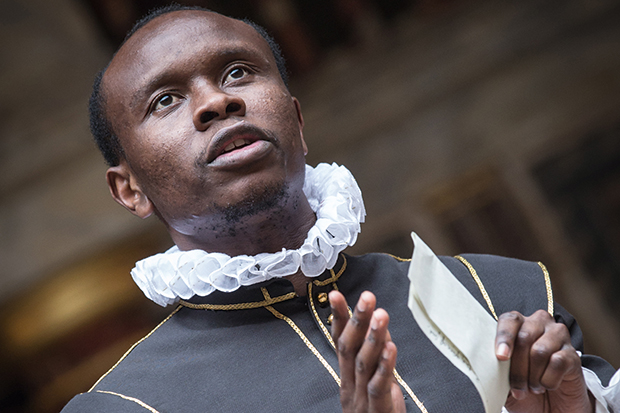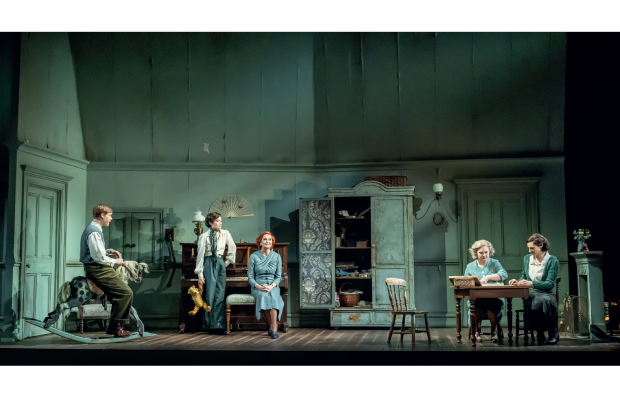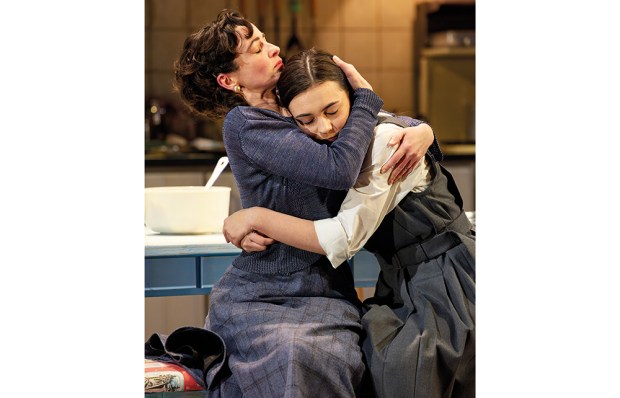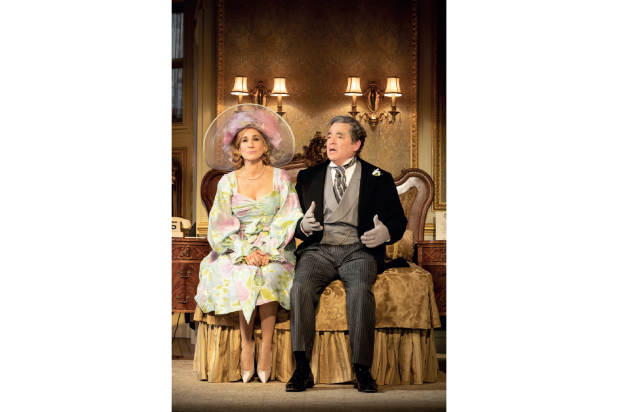Refugee crisis in the Mediterranean! Fear not. Anders Lustgarten and his trusty rescue ship are here to save mankind. Lampedusa consists of two monologues, one Italian, one English, which tackle the problem at home and abroad. We meet Stephano, a cartoon fisherman with a Zorba beard and a chunky woollen sweater who lives on Italy’s southernmost salient about 70 miles off the African coast. He follows an improbable path from xenophobia to enlightened altruism. At first he mistrusts the runaways whose corpses choke his native shore. He asks survivors why they don’t ‘speak the language’. ‘We do,’ they reply, in English. ‘This is Europe’s language.’ He saves a drowning African from a shoal of cadavers and learns that the man’s fiancée is due to join him on Lampedusa. By some miracle she arrives safely and Stephano, by now guest of honour at their wedding, is overcome with spiritual gratitude. He acclaims them for giving his country ‘life and hope’. Some might suggest that Italy well understood ‘life and hope’ long before the newcomers began arriving in coffin-ships to add to the supply. But never mind. Stephano’s honeyed conclusion slips down nicely.
Back in England we meet Denise, whose spiky language and internal contradictions make her much more fun than the worthy Stephano. She’s a half-Chinese Tory-voter from Yorkshire who loathes tax-funded indolence. By day she works as a debt enforcer. By night she studies for a degree in politics. Her feckless ‘clients’ invariably blame their debts on her. The men insult her because, as she says, no man wants to be humiliated by a woman. And the females are worse. Simple reason: ‘Women fucking hate women.’ She says her clients live in houses knee-deep with pizza boxes and spend their days consuming burgers and trashy TV shows that flicker across huge plasma screens. A gluttonous pauper on her client list is so well supplied with takeaway food that ‘she’s visible from space’.
But Denise’s distaste for welfare dependency vanishes as soon as her future is threatened. Her disabled mother, whom she detests, is summoned by Atos to discuss her eligibility for sickness benefit. Denise trains her mother to behave like ‘a spastic’ and to feign extreme helplessness at every stage of the interview in order to bamboozle the hidden cameras planted by Atos to expose simulated incapacity. The anxiety overwhelms her mother, who dies on the eve of her interview. Whereupon Denise, the enemy of state-subsidised inactivity, accuses the state of murdering her.
And there lies the charming duplicity of Lustgarten. He aspires to be a political writer but his chosen instruments are the show trial and the ducking-stool. His method is to discover culprits and to beat them up in public. Real politics is about finding remedies, not blaming innocents. And, in the end, angry Denise follows Stephano’s sugary route to liberal nirvana. She meets a Portuguese single mum whose simple, homely kindness melts her frozen heart. The message is clear. Individual acts of selflessness will resolve any humanitarian crisis. And there were plenty in the audience who leapt to their feet to applaud Lustgarten’s verdict. But I wonder how many are currently sheltering migrants in their homes or have plans to return from their Mediterranean hols with a washed-up family of Eritreans to install in the guest room.
The Globe is offering two plays for the price of one. Measure for Measure is a moral tragedy intercut with scenes of low comedy. In Dominic Dromgoole’s riotously casual production, the larks and pratfalls threaten to occlude the serious stuff. Angelo, a grisly puritan, orders a crackdown on hedonists in Vienna. Having sentenced the fun-loving Claudio to death, he offers to spare him in exchange for the virginity of his sister Isabella. These haunting, prickly scenes are presented with gripping force and clarity. Mariah Gale plays Isabella in a grey, beltless smock and with a white linen napkin encasing her damp hair like a shower cap. She’s as thin as a card and, erotically, as inviting as a puddle of spilt milk.
That’s deliberate. Making Isabella sexy is a tempting short-cut that loads her predicament with irony and gives the ice-cold Angelo an understandable motive for his conduct. But here we have two frosty and intransigent spirits who push the story to the very boundaries of credibility. Hardly surprising that the Globe preferred the drunks and pimps who caper through the brothels of Vienna. One actor dropped his breeches to expose his full anatomy below the waistline. A gasp of delighted outrage spat skywards from the auditorium. Fortunately, I was behind a pillar so I got the soundtrack, not the visuals. I spent the whole play wishing the fun would stop and the horror story would restart.
Got something to add? Join the discussion and comment below.
Get 10 issues for just $10
Subscribe to The Spectator Australia today for the next 10 magazine issues, plus full online access, for just $10.
You might disagree with half of it, but you’ll enjoy reading all of it. Try your first month for free, then just $2 a week for the remainder of your first year.














Comments
Don't miss out
Join the conversation with other Spectator Australia readers. Subscribe to leave a comment.
SUBSCRIBEAlready a subscriber? Log in